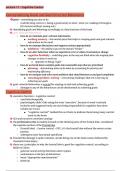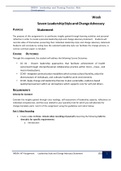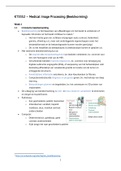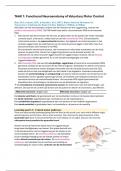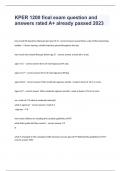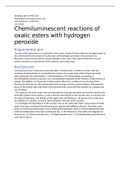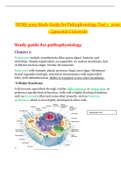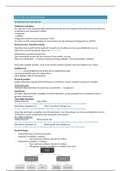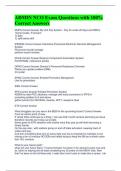Lecture 11 - Cognitive Control
Conceptualizing Goals and Goal-Directed Behaviours
🧠goals= something you aim to do
○ c ould be long-term (i.e. being a good mom) or short-term (i.e. making it through a
B70 lecture without zoning out)
🧠identifying goals and behaving accordingly is a key function of the brain
🧠goal-directed behaviours
○ how do we maintain goal-relevant information
■ working memory-the mental space that helps in keepinggoals and goal relevant
information in the mind
○ how do we manage distractions and suppress actions appropriately
■ inhibition-the ability to put on the mental “brakes”
○ how do we alter behaviour when we experience error or when circumstances change
■ cognitive flexibility-switching gears in the waywe think when the original plan
changes or doesn’t work out
● opposite to being ‘rigid’
○ how do we break down complex goals into reasonable steps that are prioritized
■ planning-determining when to do what by accountingfor priority and
maximizing efficiency
○ how do we navigate and solve novel problems that stand between us and goal completion
■ reasoning/problem-solving-overcoming challengesthat are in the way of
achieving our goals
🧠
goal-oriented behaviour iscrucialfor staying ontask and achieving goals
○ damage to any of the behaviours can be detrimental to achieving goals
Cognitive Control
🧠executive function = cognitive control
○ usedinterchangeably
○ psychologists didn’t like using the term ‘executive’, because it wasn’t entirely
inclusive and suggested only one area being responsible for cognitive functions
(which isn’t true)
■ “cognitive control” tackled this as it feels to indicate there being many control
areas in the brain
🧠
CEO and executive committee analogy
🧠
theprefrontal cortexis mainly focused on thethinkingparts of the frontal lobe, considered
thecognitive portionof thefrontal lobe
○ [frontal lobe] - [motor cortex] = PFC; it’s the frontal lobe without the motor cortex
portion
○ subregions have functional specificity
🧠
frontal lobe damage is quite common, stroke being one of the main causes followed by
traumatic brain injury
🧠
there are 4 principles to why the frontal lobe is good for cognitive control, according to
Miller & Cohen
○ generate neural activity that biases other regions
○ maintenance in the face of distractions
○ house “appropriate representations”
○ plasticity
, Generate Neural Activity That Biases Other Regions
🧠frontal lobe controls behaviour while also reigning control over other
brain areas
🧠
the brain is split intothree units
○ unit 1 -generalized function, regulates levels ofactivation and
states of vigilance
○ unit 2 -registrars, analyzes and stores informationin
sensory-related cortices
○ unit 3 -programs and controls mental activity andbehaviour
■ this accounts for the prefrontal cortex
■ when this area (the frontal lobe) is damaged, individuals are seen to act
independently and struggled w/ goal-directed behaviour
Inhibition
🧠a necessary component of an executive regions = the use of inhibition (the mental brakes)
○ i.e.the stroop task
■ the process of inhibition reduces the level of salience of a competing stimulus
that you don’t want to focus on (putting the breaks on reading the word in
order to name the colour it’s inked in)
○ this process of inhibition ties in with enhancement and suppression, brain areas that
assist with what you want to focus on become > activated while those you want to
ignore “pipe-down”
■ i.e.the houses vs faces task
Repression
🧠 the notion that we “lock out” traumatic memories from our consciousness in order to
prevent causing damage, but that can lead to actuallyforgetting about it
○ an idea proposed by Freud
🧠
a study was done to test out whether it really does get forgotten
○ participants were told to study word pairs (wordsthat go together - i.e.
teeth|jaw)
○ words inked in red are meant to be forgotten while words inked in
green are meant to be remembered
○ the results showed that to an extent, we forget things we intentionally
mean to forget
🧠
the prefrontal cortexsuppressesthehippocampuswhentold to forget something
Frontal Lobe Lesion Impact onPersonality
🧠frontal lobe damage also impacts an individual’s personality where they have a difficulty
controlling their emotions
○ seen in the case study ofPhineas Gage
○ particularly experience > anger, hostility, frustration (have difficulty controlling them,
worse off from prior to the damage)
○ a study saw this when looking at individuals w/ frontal lobe damage (frontal only),
damage beyond the frontal lobe (non-frontal) and damagethat includes frontal lobe
(f rontal involvement)
Conceptualizing Goals and Goal-Directed Behaviours
🧠goals= something you aim to do
○ c ould be long-term (i.e. being a good mom) or short-term (i.e. making it through a
B70 lecture without zoning out)
🧠identifying goals and behaving accordingly is a key function of the brain
🧠goal-directed behaviours
○ how do we maintain goal-relevant information
■ working memory-the mental space that helps in keepinggoals and goal relevant
information in the mind
○ how do we manage distractions and suppress actions appropriately
■ inhibition-the ability to put on the mental “brakes”
○ how do we alter behaviour when we experience error or when circumstances change
■ cognitive flexibility-switching gears in the waywe think when the original plan
changes or doesn’t work out
● opposite to being ‘rigid’
○ how do we break down complex goals into reasonable steps that are prioritized
■ planning-determining when to do what by accountingfor priority and
maximizing efficiency
○ how do we navigate and solve novel problems that stand between us and goal completion
■ reasoning/problem-solving-overcoming challengesthat are in the way of
achieving our goals
🧠
goal-oriented behaviour iscrucialfor staying ontask and achieving goals
○ damage to any of the behaviours can be detrimental to achieving goals
Cognitive Control
🧠executive function = cognitive control
○ usedinterchangeably
○ psychologists didn’t like using the term ‘executive’, because it wasn’t entirely
inclusive and suggested only one area being responsible for cognitive functions
(which isn’t true)
■ “cognitive control” tackled this as it feels to indicate there being many control
areas in the brain
🧠
CEO and executive committee analogy
🧠
theprefrontal cortexis mainly focused on thethinkingparts of the frontal lobe, considered
thecognitive portionof thefrontal lobe
○ [frontal lobe] - [motor cortex] = PFC; it’s the frontal lobe without the motor cortex
portion
○ subregions have functional specificity
🧠
frontal lobe damage is quite common, stroke being one of the main causes followed by
traumatic brain injury
🧠
there are 4 principles to why the frontal lobe is good for cognitive control, according to
Miller & Cohen
○ generate neural activity that biases other regions
○ maintenance in the face of distractions
○ house “appropriate representations”
○ plasticity
, Generate Neural Activity That Biases Other Regions
🧠frontal lobe controls behaviour while also reigning control over other
brain areas
🧠
the brain is split intothree units
○ unit 1 -generalized function, regulates levels ofactivation and
states of vigilance
○ unit 2 -registrars, analyzes and stores informationin
sensory-related cortices
○ unit 3 -programs and controls mental activity andbehaviour
■ this accounts for the prefrontal cortex
■ when this area (the frontal lobe) is damaged, individuals are seen to act
independently and struggled w/ goal-directed behaviour
Inhibition
🧠a necessary component of an executive regions = the use of inhibition (the mental brakes)
○ i.e.the stroop task
■ the process of inhibition reduces the level of salience of a competing stimulus
that you don’t want to focus on (putting the breaks on reading the word in
order to name the colour it’s inked in)
○ this process of inhibition ties in with enhancement and suppression, brain areas that
assist with what you want to focus on become > activated while those you want to
ignore “pipe-down”
■ i.e.the houses vs faces task
Repression
🧠 the notion that we “lock out” traumatic memories from our consciousness in order to
prevent causing damage, but that can lead to actuallyforgetting about it
○ an idea proposed by Freud
🧠
a study was done to test out whether it really does get forgotten
○ participants were told to study word pairs (wordsthat go together - i.e.
teeth|jaw)
○ words inked in red are meant to be forgotten while words inked in
green are meant to be remembered
○ the results showed that to an extent, we forget things we intentionally
mean to forget
🧠
the prefrontal cortexsuppressesthehippocampuswhentold to forget something
Frontal Lobe Lesion Impact onPersonality
🧠frontal lobe damage also impacts an individual’s personality where they have a difficulty
controlling their emotions
○ seen in the case study ofPhineas Gage
○ particularly experience > anger, hostility, frustration (have difficulty controlling them,
worse off from prior to the damage)
○ a study saw this when looking at individuals w/ frontal lobe damage (frontal only),
damage beyond the frontal lobe (non-frontal) and damagethat includes frontal lobe
(f rontal involvement)

